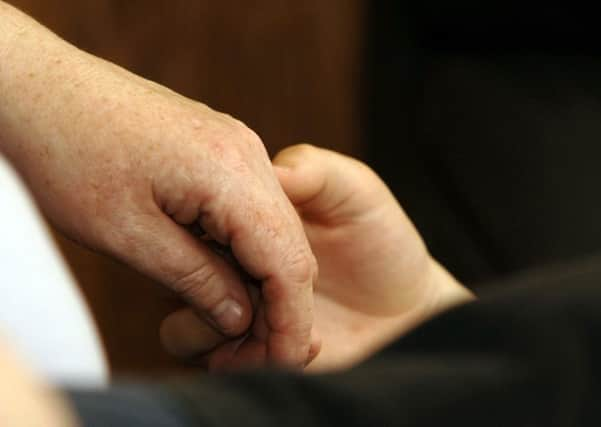James Jopling: Men need to open up about feelings


I recently went to an SPL football match with my 11-year-old son. The two older gentleman behind us spoke rarely but always with reference to what was on the pitch, players from bygone eras or how long to wait until they went for a pie. I was left wondering, despite their decades of friendship, if they ever spoke of anything else?
Nowhere is the question of what it means to be a “real man” as central to national identity as Scotland. Whether it’s real or perceived, Scotland is dominated by an image of dour, macho, football-loving maleness – but how does that really play out for men at home, in their workplaces and communities?
Advertisement
Hide AdAdvertisement
Hide AdWhat we need to understand is that the expectations and pressures that men in Scotland face today are contributing to a health crisis of which suicide is one of the biggest factors. Men in mid-life are particularly at risk. Life events such as divorce and redundancy combine with being part of the ‘buffer’ generation, leaving men not sure whether to be like their older, more traditional, strong silent austere fathers or like their younger, more progressive sons.


Loss of industries and the changing face of the labour market has also had a particular impact on working-class men. As the Samaritans CEO Ruth Sutherland recently wrote in the Huffington Post, “It is not simply having a job that is important to fulfil masculine identity but also the kind of job. With the loss of traditional male occupations, working-class men have also lost a source of masculine pride.”
In Scotland, we also see high rates of alcoholism, violence, domestic abuse and suicide, with men 3.5 times more likely to take their own lives than women. While suicide rates in Scotland have decreased in recent years, they remain the highest in the UK, so there is no room for complacency.
Changing the culture to one where men feel able and permitted to talk about how they’re feeling has to start young. Urging a man in his 50s – such as those I sat near at the football – to open up and be in touch with his feelings goes against decades of social conditioning. Invariably services are supporting people of this age in crisis, when we really should be working to prevent the crisis far earlier.
At Samaritans we work in schools throughout Scotland to support teachers to deliver our DEAL – Developing Emotional Awareness and Listening – programme, as well as supporting schools where there has been a suicide or other traumatic incident. The Duke and Duchess of Cambridge’s recent visit to speak to Young Scotland in Mind, and other mental health and bullying projects was a welcome sign of the platform which is very necessarily being given to mental health in young people. It’s important that relevant organisations and the media partner to raise awareness and generate a public conversation about these issues.
Making the change to one where talking openly is normal regardless of gender takes community – See Me’s excellent current campaign on the “Power of OK” echoes the heart of Samaritans’ approach. Providing a receptive ear and being willing to listen gives people struggling with daily life a way to work through their feelings and find solutions. It takes heart, patience and courage to be that listening ear, but it doesn’t necessarily require professional skills.
Samaritans in Scotland is working with others across the country to ensure that suicide prevention really does have an impact, and that our service is accessible and well-promoted where it is needed the most. It’s why we launched our Freecall 116 123 number this year, so that anyone can reach us whenever they need to, without worrying about the cost or the number appearing on their phone bill.
We can work towards a Scotland where men at the football, in the pub or simply with friends can feel more secure and comfortable asking each other if they are OK, and sometimes answering with something other than “Fine.” It will benefit us all if we succeed.
Advertisement
Hide AdAdvertisement
Hide AdIf you, or anyone you know, needs someone to listen, you can talk to Samaritans. You can tell us anything, it always stays between us. We are available round the clock, every single day of the year, providing a safe place for anyone who is struggling to cope. Please call free on 116 123, email [email protected], or visit www.samaritans.org to find details of the nearest branch.
• James Jopling, Executive Director for Samaritans Scotland